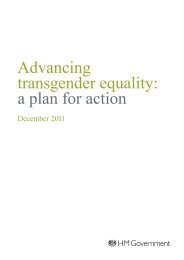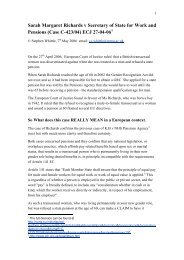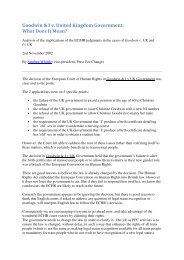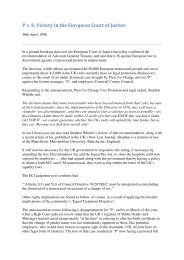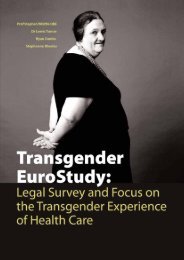R (on the application of Rogers) v Swindon NHS Primary Care Trust ...
R (on the application of Rogers) v Swindon NHS Primary Care Trust ...
R (on the application of Rogers) v Swindon NHS Primary Care Trust ...
You also want an ePaper? Increase the reach of your titles
YUMPU automatically turns print PDFs into web optimized ePapers that Google loves.
y Mr Havers that <strong>the</strong> same principle applies to a policy based <strong>on</strong> <strong>the</strong> absence <strong>of</strong>regulatory approval. He c<strong>on</strong>cluded that to decide that unlicensed use would notbe funded save in undefined excepti<strong>on</strong>al circumstances was not <strong>of</strong> itself unlawful.62. We would accept that c<strong>on</strong>clusi<strong>on</strong> subject to this important qualificati<strong>on</strong>, whichcan in our view be seen from <strong>the</strong> passage just quoted. In it Auld LJ stresses thata policy which allows for excepti<strong>on</strong>s in undefined excepti<strong>on</strong>al circumstances is notunlawful "provided that <strong>the</strong> policy genuinely recognises <strong>the</strong> possibility <strong>of</strong> <strong>the</strong>rebeing an overriding clinical need and requires each request for treatment to bec<strong>on</strong>sidered <strong>on</strong> its individual merits." As we see it, that means that a policy <strong>of</strong>withholding assistance save in unstated excepti<strong>on</strong>al circumstances (in <strong>the</strong> caseaddressed by Auld LJ, and no doubt in this case also, overriding clinical need) willbe rati<strong>on</strong>al in <strong>the</strong> legal sense provided that it is possible to envisage, and <strong>the</strong>decisi<strong>on</strong>-maker does envisage, what such excepti<strong>on</strong>al circumstances might be. Ifit is not possible to envisage any such circumstances, <strong>the</strong>n <strong>the</strong> policy will be inpractice a complete refusal <strong>of</strong> assistance: and irrati<strong>on</strong>al as such because it issought to be justified not as a complete refusal but as a policy <strong>of</strong> excepti<strong>on</strong>ality.63. Thus we would not hold that <strong>the</strong> policy was arbitrary because it refers tounidentified excepti<strong>on</strong>al circumstances. The essential questi<strong>on</strong> is whe<strong>the</strong>r <strong>the</strong>policy was rati<strong>on</strong>al; and, in deciding whe<strong>the</strong>r it is rati<strong>on</strong>al or not, <strong>the</strong> court mustc<strong>on</strong>sider whe<strong>the</strong>r <strong>the</strong>re are any relevant excepti<strong>on</strong>al circumstances which couldjustify <strong>the</strong> PCT refusing treatment to <strong>on</strong>e woman within <strong>the</strong> eligible group butgranting it to ano<strong>the</strong>r. And to anticipate, <strong>the</strong> difficulty that <strong>the</strong> PCT encounters in<strong>the</strong> present case is that while <strong>the</strong> policy is stated to be <strong>on</strong>e <strong>of</strong> excepti<strong>on</strong>ality, nopersuasive grounds can be identified, at least in clinical terms, for treating <strong>on</strong>epatient who fulfils <strong>the</strong> clinical requirements for Herceptin treatment differentlyfrom o<strong>the</strong>rs in that cohort.64. This approach is in our view c<strong>on</strong>sistent with <strong>the</strong> c<strong>on</strong>clusi<strong>on</strong> stated by Auld LJin <strong>the</strong> same case at p 993, which also c<strong>on</strong>tains an important statement <strong>of</strong>principle by Sir Thomas Bingham MR in <strong>the</strong> Cambridge Health Authority case.Auld LJ said:"I accept, <strong>of</strong> course, that it is a matter for <strong>the</strong> medical judgment <strong>of</strong> <strong>the</strong> authority,not <strong>the</strong> court, what, if any, effective medical treatment <strong>the</strong>re might be fortranssexualism and any sequelae. As Sir Thomas Bingham MR said in <strong>the</strong>Cambridge Health Authority case [1995] 1 WLR 898, 905:'<strong>the</strong> courts are not, c<strong>on</strong>trary to what is sometimes believed, arbiters as to <strong>the</strong>merits <strong>of</strong> cases <strong>of</strong> this kind. Were we to express opini<strong>on</strong>s as to <strong>the</strong> likelihood <strong>of</strong><strong>the</strong> effectiveness <strong>of</strong> medical treatment, or as to <strong>the</strong> merits <strong>of</strong> medical judgment,<strong>the</strong>n we should be straying far from <strong>the</strong> sphere which under our c<strong>on</strong>stituti<strong>on</strong> isaccorded to us. We have <strong>on</strong>e functi<strong>on</strong> <strong>on</strong>ly, which is to rule up<strong>on</strong> <strong>the</strong> lawfulness<strong>of</strong> decisi<strong>on</strong>s. That is a functi<strong>on</strong> to which we should strictly c<strong>on</strong>fine ourselves.'However, if a regi<strong>on</strong>al health authority devises a policy not to provide treatmentsave in cases <strong>of</strong> overriding clinical need, it makes a n<strong>on</strong>sense <strong>of</strong> <strong>the</strong> policy if, as amatter <strong>of</strong> its medical judgment, <strong>the</strong>re is no effective treatment for it for which<strong>the</strong>re could be an overriding clinical need. The same applies to any o<strong>the</strong>rc<strong>on</strong>diti<strong>on</strong> caused by transsexualism such as a mental illness <strong>of</strong> <strong>the</strong> seriousnessdescribed by Dr Sudell. If <strong>the</strong> authority c<strong>on</strong>siders <strong>the</strong> cause <strong>of</strong> such a c<strong>on</strong>diti<strong>on</strong> tobe untreatable by horm<strong>on</strong>al treatment and surgery, it is hard to see how it couldregard <strong>the</strong> c<strong>on</strong>diti<strong>on</strong> itself as an overriding need for such treatment.In my view, <strong>the</strong> stance <strong>of</strong> <strong>the</strong> authority, coupled with <strong>the</strong> near uniformity <strong>of</strong> itsreas<strong>on</strong>s for rejecting each <strong>of</strong> <strong>the</strong> applicants' requests for funding was not a




